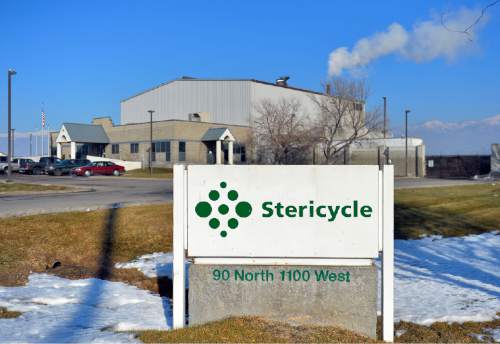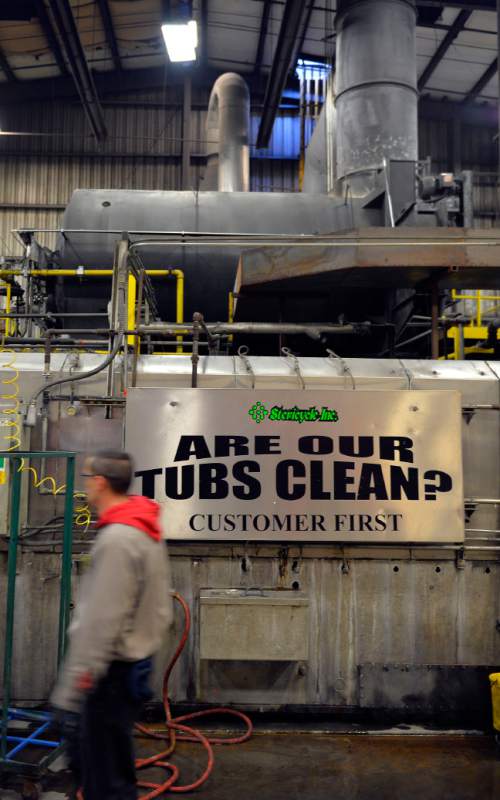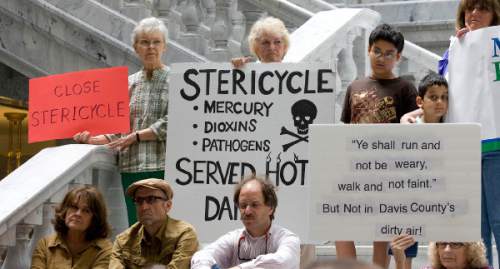This is an archived article that was published on sltrib.com in 2016, and information in the article may be outdated. It is provided only for personal research purposes and may not be reprinted.
Gina Cooley moved to Erda in 2014 after her pediatrician advised her that pollution from a medical-waste incinerator in North Salt Lake could be the source of her then-4-year-old son's near-daily headaches.
That same year, Stericycle also decided to move to Tooele County.
Cooley heard about the relocation only after the decision was final, she said. And before Monday's public hearing on the proposed facility's air-quality permit, she was under the impression the facility would be farther away from the county's residential communities.
"It's frustrating," she said. "I know something has to be done with the medical waste, but I'm frustrated there isn't more information available."
The Illinois-based Stericyle is moving its North Salt Lake incineration facility about 30 miles northwest of downtown Tooele as part of a settlement that allowed the company to waive half a $2.3 million fine from Utah's Division of Air Quality after its incinerator exceeded pollution limits.
Locals questioned the terms of the 2014 settlement.
"To say that I am disappointed with the fine being waived would be an understatement," said state Rep. Doug Sagers, R-Tooele. "I considered that a slap in the face to Tooele County and to the people who reside here."
Sagers encouraged the DAQ to take Stericycle's past into account and maintain vigilance in its oversight of the company after it moves. The only thing Tooele residents have to rely on, he said, are the state's assurances that the new facility will be safe and clean.
The DAQ issued Stericycle a Notice of Violation in 2013, when it was discovered the company had exceeded the permitted limits for emissions of several pollutants during emergency bypass events. The company was also cited for its failure to report all instances of these overages, and for failing to maintain normal operating conditions during a subsequent stack test.
Several of the two-dozen individuals who attended the meeting — locals complained that the timing of the hearing, which began at 5:30 in Tooele, made it difficult for residents commuting home from the Salt Lake City area to attend — echoed Sagers' concerns about oversight.
"The monitoring and the data from that monitoring must be very strict and publicly available," said Mike Abdo, a Tooele resident. "We have experiences in the past with being misled by this company with regard to their emissions. I don't want that to happen again if they are allowed to build."
Katy Carlile, another Tooele resident, said she has followed Stericycle's move to Tooele since the first hearings on the topic. Overall, she said, it feels as though the state has not taken residents' concerns into account.
"I felt like we were brushed off," she said. "Like people said, 'It will really be OK; you just have to trust us.' "
There wasn't a lot of trust evident at Monday's hearing, with advocacy groups raising complaints about the permit documents the DAQ released to the public.
Cindy King, a member of the Utah chapter of the Sierra Club, said the state agency had not responded to her requests to view the new plant's start-up, shut-down and maintenance procedure plans, which she said are federally required.
Jon Black, the DAQ engineer overseeing Stericycle's new permit, said there is no such documentation because federal regulations do not require such plans.
And Ashley Soltysiak, a senior policy associate with HEAL Utah, raised concerns about the accuracy of some portions of the permit. The environmental group would like to "fact-check the underlying assumptions" behind those documents. "With Stericycle's track record," Soltysiak said, "they need to maintain the highest level of transparency in this process."
Tooele-area residents were most disturbed by Stericycle's plan to construct not one but two medical waste incinerators at the Tooele County site, nearly doubling the facility's capacity and increasing the amount of pollution it will be permitted to emit on an annual basis.
The company has said it does not plan to build both incinerators at the same time but will likely pursue a phased approach. Stericycle must still obtain a solid waste permit, in addition to finalizing its air quality permit, before moving ahead with its relocation plans.
Carlile said she understood why North Salt Lake would want the facility moved, given the Salt Lake Valley's ongoing struggle with particulate pollution, but didn't see how moving the pollution to Tooele Valley would solve the problem, especially with the projections for rapid growth in the county's near future.
Comment on Stericycle
O Comments on a proposed Tooele County air quality permit for Stericycle may be emailed to jlblack@utah.gov or mailed to the Division of Air Quality, 195 N. 1950 West, Salt Lake City, Utah 84114. Comments must be received on or before May 20.







